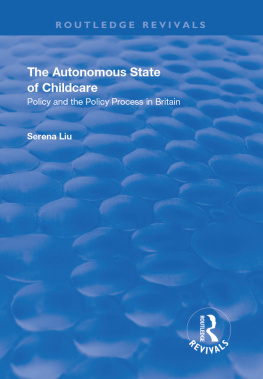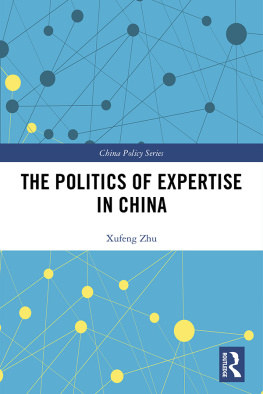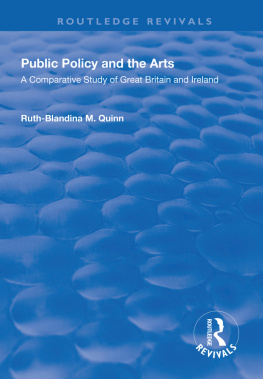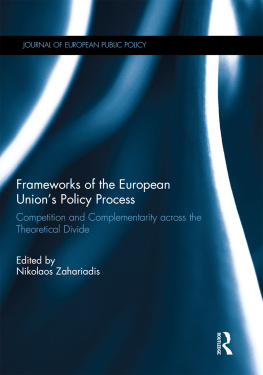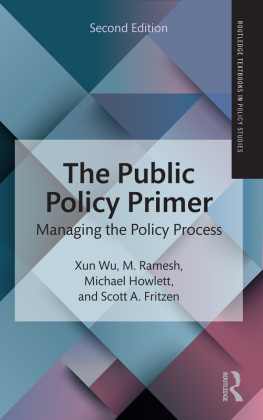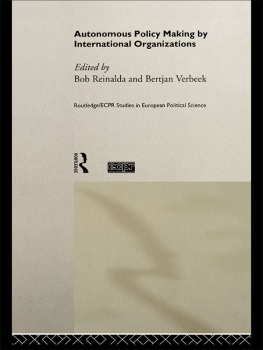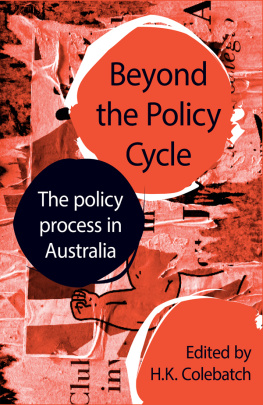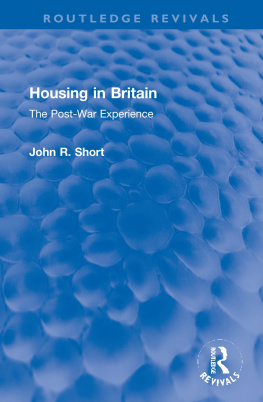THE AUTONOMOUS STATE OF CHILDCARE
For Huw
The Autonomous State of Childcare
Policy and the policy process in Britain
SERENA LIU
Anglia Polytechnic University
First published 2001 by Ashgate Publishing
Reissued 2018 by Routledge
2 Park Square, Milton Park, Abingdon, Oxon OX14 4RN
711 Third Avenue, New York, NY 10017, USA
Routledge is an imprint of the Taylor & Francis Group, an informa business
Copyright Serena Liu 2001
All rights reserved. No part of this book may be reprinted or reproduced or utilised in any form or by any electronic, mechanical, or other means, now known or hereafter invented, including photocopying and recording, or in any information storage or retrieval system, without permission in writing from the publishers.
Notice:
Product or corporate names may be trademarks or registered trademarks, and are used only for identification and explanation without intent to infringe.
Publishers Note
The publisher has gone to great lengths to ensure the quality of this reprint but points out that some imperfections in the original copies may be apparent.
Disclaimer
The publisher has made every effort to trace copyright holders and welcomes correspondence from those they have been unable to contact.
A Library of Congress record exists under LC control number: 00110699
ISBN 13: 978-1-138-63576-0 (hbk)
ISBN 13: 978-1-138-63578-4 (pbk)
ISBN 13: 978-1-315-20408-6 (ebk)
Contents
It was twenty years ago that I first wanted to write a book. Coming in and out of the imaginative world, I never dreamt that my first book would be an academic work on British policy and politics, using social theory.
This book comes from my Ph.D. thesis of a similar name, submitted to the Department of Sociology, University of Essex. Despite some crisis periods during the course of doing this piece of work, it has unexpectedly aroused interest within close circles. Hopefully with publication, it will reach a wider audience, and be useful for other attempts to understand the social and political world.
The Ph.D. work was supervised mainly by Lydia Morris, and for some shorter periods, by Mary Mcintosh and Rob Stones respectively. Further revision of the text benefited from the recommendations from John Scott, and Martin Smith of the University of Sheffield. The scholarship was refined by engaging with the many lectures, seminars and discussion groups of the Department of Sociology, University of Essex, during the three years when Anthony Woodiwiss was the Head of Department.
Grateful thanks are also sent to the Department of Sociology, University of Hong Kong, where I first studied sociology and gender; and to Good Hope School, Hong Kong, where I had the opportunity to learn English extensively.
The Rotary Foundation, Rotary International, funded the first year of my study in Britain. The Fuller/Bequest Research Fund of the Department of Sociology, University of Essex, supported the research expenses.
One of the greatest difficulties of doing this piece of work was to try to write English correctly. My partner, Huw James, has helped me all along. He has been very helpful and supportive in every way, without which this book would not be possible.
Serena Liu
Cambridge
July 2000
| AGM | Annual General Meeting |
| AMA | Association of Metropolitan Authorities |
| BAECE | British Association for Early Childhood Education |
| CAVE | Campaign Against Vouchers in Education |
| CBC | Child Benefit Centre |
| CPS | Centre for Policy Studies |
| DES | Department of Education and Science |
| DFE | Department for Education |
| DfEE | Department for Education and Employment |
| DHSS | Department of Health and Social Security |
| DoH | Department of Health |
| ECEF | Early Childhood Education Forum |
| EYDCP | Early Years Development and Childcare Partnership |
| GM | Grant-Maintained |
| HC | House of Commons |
| HMSO | Her Majestys Stationery Office |
| KCN | Kids Clubs Network |
| LEA | Local Education Authority |
| LGMB | Local Government Management Board |
| LMS | Local Management Scheme |
| MP | Member of Parliament |
| NAHT | National Association of Head Teachers |
| NEYN | National Early Years Network |
| NCB | National Childrens Bureau |
| NCMA | National Childminding Association |
| NCNE | National Campaign for Nursery Education |
| NUT | National Union of Teachers |
| NVC | Nursery Voucher Centre |
| NVQ | National Vocational Qualifications |
| Ofsted | Office for Standards in Education |
| PLA | Preschool Learning Alliance |
| PPA | Pre-school Playgroup Association |
| RgNI | Registered Nursery Inspector |
| SCAA | School Curriculum and Assessment Authority |
| SEN | Special Educational Needs |
| SSA | Standard Spending Assessment |
| TEC | Training and Enterprise Council |
| TES | Times Educational Supplement |
We make history, but history is not always made as we would wish. Public childcare provision in Britain is one of the issues that has raised much passion and been the source of much disappointment. Childcare provided by the public sector, which is free of charge to parents, has been limited. Public policy has been slow to change in terms of providing more childcare. Insufficient public childcare provision is an important barrier to the achievement of equal citizenship rights for women, in particular, the right to employment. Against this background, this book sets out to search for the crucial factors that have constrained the development of childcare policy and public childcare provision. It looks particularly at the developments in the 1990s which led to the introduction of the Nursery Education Voucher Scheme. This policy initiative was introduced by a Conservative Government in four pilot local authority areas in April 1996 and nationwide in April 1997. The original discussion which preceded the scheme started with the intention of expanding provision to improve employment opportunities for women. However the subsequent scheme, in only providing part-time pre-school education for four-year-olds, was of little help to women who wanted to take up paid work, but were bound by childcare commitments.
In this introductory chapter, I explain first the issue of childcare provision, its relation to womens rights to employment and other citizenship rights. Then, I present the analytical framework for the study. This is followed by an introduction to the Nursery Education Voucher Scheme and the process surrounding its conception, implementation and subsequent replacement. Last but not the least, I explain the research methods and the research process.

